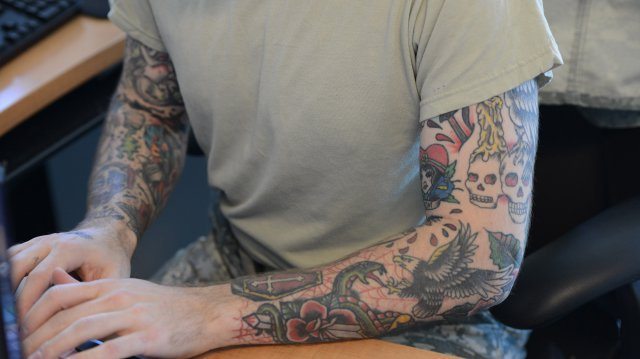The Army will update its policy on tattoos during the coming weeks, making it more accommodating to current social norms, the Army’s chief of staff said.
During a press conference during the Association of the United States Army Global Force Symposium and Exposition here, Army Chief of Staff Gen. Ray Odierno said the service regularly reviews and makes updates to Army Regulation 670-1.
“As part of the regular process that we go through in reviewing regulations, covering the wear and appearance of the Army uniform, and the appearance of our Soldiers, we will be releasing in the coming weeks, an update to that policy, and the most notable change is going to be the change in the tattoo policy in the Army,” Odierno said.
Soldiers will no longer be limited to a particular size or number of tattoos permitted on the arms or legs, Odierno said, provided those tattoos are not extremist, indecent, sexist or racist.
The policy will, however, continue to prohibit tattoos above the T-shirt neckline, on the head, face, wrists and hands. There will be an exception allowing one ring tattoo on each hand.
Odierno said that changes to the policy came after listening to feedback from Soldiers, and after discussion with senior enlisted leaders.
“We have listened to the Soldiers,” Odierno said. “I’ve talked to our sergeants major and our non-commissioned officers and some of our officers and frankly, society is changing its view of tattoos, and I think we need to change along with it.”
During an interview last week, Sgt. Maj. of the Army Daniel A. Dailey discussed the upcoming change to the Army tattoo policy. He said that the message from the Soldiers he talks to is clear: Soldiers have tattoos, tattoos are acceptable now, and the tattoo policy might affect a decision to re-enlist.
“You can’t go anywhere without hearing about the Army’s tattoo policy,” Dailey said. “It came up when I was at the U.S. Army Sergeants Major Academy too. So it’s not just Soldiers, but leaders as well.”
The sergeant major said American culture has changed, and that tattoos are more accepted now than they have ever been before. The Army is a reflection of American society, and American society, he said, accepts tattoos.
“I think this is a realization that we are in a different generation,” he said. “Tattoos are more prevalent in young Americans than I think they have ever been throughout American history.”
When it was implemented, the current Army tattoo policy did not force out Soldiers who had tattoos below the elbow or knee or above the neck line. However, the policy did require Soldiers to have those tattoos documented. It also limited additional tattoos in those places.
“These Soldiers understand that, they know they are grandfathered in,” Dailey said. “But they have fears. We have documented every one of those tattoos, and they expect that could one day be used against them with regards to promotions or things like that.”
Dailey said he has asked Soldiers about how the current tattoo policy might affect their decision to separate from military service. He said “overwhelmingly,” Soldiers have said the policy would play a role in their deciding to stay in or to leave.
Dailey said he did not want the tattoo policy to be the deciding factor for why a good Soldier might decide to leave the Army. He said he felt that the policy might in some way be at odds with the requirement to maintain an all-volunteer force.
“So then we struggle with – do the standards of discipline we’ve established override the needs of what we need to maintain the all-volunteer force, and the quality all-volunteer force, even more so as we draw down,” he asked. “When we move this standard too far to the right, can we actually maintain the all-volunteer force in the future?”
Dailey’s discussions with Soldiers and his concerns regarding the effects of the existing tattoo policy on the Army’s ability to maintain the all-volunteer force, were included in his own recommendations regarding the tattoo policy that he made to the Army chief of staff and the Army secretary.










